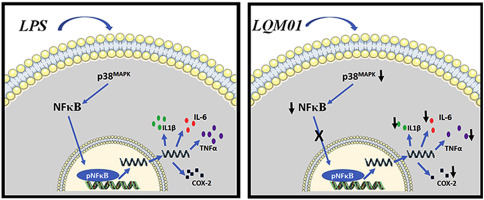当前位置:
X-MOL 学术
›
Neurochem. Int.
›
论文详情
Our official English website, www.x-mol.net, welcomes your
feedback! (Note: you will need to create a separate account there.)
Indole-3-guanylhydrazone hydrochloride mitigates long-term cognitive impairment in a neonatal sepsis model with involvement of MAPK and NFκB pathways.
Neurochemistry international ( IF 4.4 ) Pub Date : 2019-12-23 , DOI: 10.1016/j.neuint.2019.104647 Luana Heimfarth 1 , Alexandra Maria Santos Carvalho 1 , Jullyana de Souza Siqueira Quintans 1 , Erik Willyame Menezes Pereira 1 , Natália Teles Lima 1 , Mikaella Tuanny Bezerra Carvalho 1 , Rosana de Souza Siqueira Barreto 1 , José Cláudio Fonseca Moreira 2 , Edeildo F da Silva-Júnior 3 , Martine Schmitt 4 , Jean-Jacques Bourguignon 4 , Thiago M de Aquino 3 , João X de Araújo-Júnior 5 , Lucindo J Quintans-Júnior 1
Neurochemistry international ( IF 4.4 ) Pub Date : 2019-12-23 , DOI: 10.1016/j.neuint.2019.104647 Luana Heimfarth 1 , Alexandra Maria Santos Carvalho 1 , Jullyana de Souza Siqueira Quintans 1 , Erik Willyame Menezes Pereira 1 , Natália Teles Lima 1 , Mikaella Tuanny Bezerra Carvalho 1 , Rosana de Souza Siqueira Barreto 1 , José Cláudio Fonseca Moreira 2 , Edeildo F da Silva-Júnior 3 , Martine Schmitt 4 , Jean-Jacques Bourguignon 4 , Thiago M de Aquino 3 , João X de Araújo-Júnior 5 , Lucindo J Quintans-Júnior 1
Affiliation

|
BACKGROUND
Neonatal sepsis is defined as a systemic inflammatory response caused by a suspected or proven infection, occurring in the first month of life, and remains one of the main causes of morbidity and mortality in newborn and preterm infants. Frequently, survivors of neonatal sepsis have serious long-term cognitive impairment and adverse neurologic outcomes. There is currently no specific drug treatment for sepsis. Indole-3-guanylhydrazone hydrochloride (LQM01) is an aminoguanidine derivative that has been described as an anti-inflammatory, antihypertensive and antioxidant with potential applicability in inflammatory diseases.
METHODS
We used a LPS-challenged neonatal sepsis rodent model to investigate the effect of LQM01 on cognitive impairment and anxiety-like behavior in sepsis mice survivors, and examined the possible molecular mechanisms involved.
RESULTS
It was found that LQM01 exposure during the neonatal period reduces anxiety-like behavior and cognitive impairment caused by lipopolysaccharides (LPS) in adult life. Additionally, treatment with LQM01 decreased pro-inflammatory cytokine levels and reduced NFκB, COX-2, MAPK and microglia activation in hippocampus of neonatal mice. Furthermore, LQM01 was also able to prevent oxidative damage in hippocampus of neonatal mice and preserve brain barrier integrity.
CONCLUSIONS
LQM01 attenuated inflammatory reactions in an LPS-challenged neonatal sepsis mice model through the MAPK and NFκB signaling pathways and microglia activation suppression. All these findings are associated with mitigated cognitive impairment in 70 days-old LQM01 treated-mice.
GENERAL SIGNIFICANCE
We revealed the effect of LQM01 as an anti-septic agent, and the role of crucial molecular pathways in mitigating the potential damage caused by neonatal sepsis.
中文翻译:

盐酸吲哚-3-胍基hydr减轻了患有MAPK和NFκB通路的新生儿败血症模型中的长期认知障碍。
背景技术新生儿败血症被定义为由怀疑或证实的感染引起的全身性炎症反应,发生于生命的第一个月,并且仍然是新生儿和早产儿发病和死亡的主要原因之一。通常,新生儿败血症的幸存者具有严重的长期认知障碍和不良的神经系统结果。目前尚无针对脓毒症的特异性药物治疗。吲哚-3-胍基hydro盐酸盐(LQM01)是一种氨基胍衍生物,已被描述为一种抗炎,抗高血压和抗氧化剂,在炎症性疾病中具有潜在的适用性。方法我们使用LPS攻击的新生儿败血症啮齿动物模型研究LQM01对败血症小鼠幸存者认知障碍和焦虑样行为的影响,并研究了可能的分子机制。结果发现,新生儿时期暴露于LQM01可以减少成人生活中脂多糖(LPS)引起的焦虑样行为和认知障碍。此外,用LQM01处理可降低新生小鼠海马中的促炎细胞因子水平,并降低NFκB,COX-2,MAPK和小胶质细胞活化。此外,LQM01还能够防止新生小鼠海马中的氧化损伤并保持脑屏障的完整性。结论LQM01通过MAPK和NFκB信号通路以及小胶质细胞激活抑制作用,减轻了LPS攻击的新生败血症小鼠模型中的炎症反应。所有这些发现均与70天大的LQM01治疗小鼠的认知功能障碍减轻有关。
更新日期:2019-12-23
中文翻译:

盐酸吲哚-3-胍基hydr减轻了患有MAPK和NFκB通路的新生儿败血症模型中的长期认知障碍。
背景技术新生儿败血症被定义为由怀疑或证实的感染引起的全身性炎症反应,发生于生命的第一个月,并且仍然是新生儿和早产儿发病和死亡的主要原因之一。通常,新生儿败血症的幸存者具有严重的长期认知障碍和不良的神经系统结果。目前尚无针对脓毒症的特异性药物治疗。吲哚-3-胍基hydro盐酸盐(LQM01)是一种氨基胍衍生物,已被描述为一种抗炎,抗高血压和抗氧化剂,在炎症性疾病中具有潜在的适用性。方法我们使用LPS攻击的新生儿败血症啮齿动物模型研究LQM01对败血症小鼠幸存者认知障碍和焦虑样行为的影响,并研究了可能的分子机制。结果发现,新生儿时期暴露于LQM01可以减少成人生活中脂多糖(LPS)引起的焦虑样行为和认知障碍。此外,用LQM01处理可降低新生小鼠海马中的促炎细胞因子水平,并降低NFκB,COX-2,MAPK和小胶质细胞活化。此外,LQM01还能够防止新生小鼠海马中的氧化损伤并保持脑屏障的完整性。结论LQM01通过MAPK和NFκB信号通路以及小胶质细胞激活抑制作用,减轻了LPS攻击的新生败血症小鼠模型中的炎症反应。所有这些发现均与70天大的LQM01治疗小鼠的认知功能障碍减轻有关。









































 京公网安备 11010802027423号
京公网安备 11010802027423号